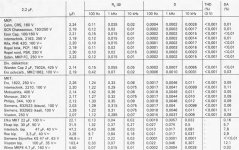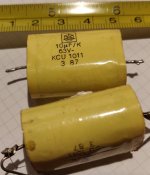Looking around on various sites : Why is it so hard to find small (so low voltage) MKP (polypropylene) capacitors for audio ?
There are : AC/puls , DC link , motor run, power factor correction, RC snubber, RF and power , RF microwave, suppression film capacitors and... general use .
Which are for audio , in the 4,7 uF to 10 uF range ? ( for input of amps , not for speaker filters)
Sure I can find these Wima red ones and those grey Kemet, but often only for high voltages which makes them very bulky.
There are : AC/puls , DC link , motor run, power factor correction, RC snubber, RF and power , RF microwave, suppression film capacitors and... general use .
Which are for audio , in the 4,7 uF to 10 uF range ? ( for input of amps , not for speaker filters)
Sure I can find these Wima red ones and those grey Kemet, but often only for high voltages which makes them very bulky.
Maybe it is difficult to make or handle very thin polypropylene film? Audio is a small niche market. There are not many instances in circuits where you actually need a low voltage 10uF film capacitor, despite what many people think.
Right.Maybe it is difficult to make or handle very thin polypropylene film? Audio is a small niche market. There are not many instances in circuits where you actually need a low voltage 10uF film capacitor, despite what many people think.
It took me years to find out the reason for huge capacitors used on a microphone preamplifier.
450V 33μF where there is no need for more that 63V. The reason is simply price and availability.
Erse makes lower voltage caps for audio, they are very good and cost is reasonable.
These other caps could be good too and over-specified for audio purposes.
Always think about the signal, the AC, the DC and the peeks, and RMS, it needs to match.
These other caps could be good too and over-specified for audio purposes.
Always think about the signal, the AC, the DC and the peeks, and RMS, it needs to match.
Erse makes lower voltage caps for audio, they are very good and cost is reasonable.
These other caps could be good too and over-specified for audio purposes.
Always think about the signal, the AC, the DC and the peeks, and RMS, it needs to match.
A search for those film caps just gave me the usual very same caps but named "audio grade".
Where are the low voltage ?
Where is the reasonable cost ?
Last edited:
I have found that the Polyethylene Terephthalate (PET) capacitors from Wima are nearly as good as the polypropylene, and are a good compromise due to their small size. A 10 µF 50 volt Wima MKS2B051001N00JO00 is only 7 x 11 mm. A little pricey @ $2.51 each, though.
I have found that the Polyethylene Terephthalate (PET) capacitors from Wima are nearly as good as the polypropylene, and are a good compromise due to their small size. A 10 µF 50 volt Wima MKS2B051001N00JO00 is only 7 x 11 mm. A little pricey @ $2.51 each, though.
PET is MKT or MKS , polyester then. A good compromise.
Elektor tested caps for audio back in the 90'ties: MKP the best.
Attachments
Kemet F461 have 15mm lead spacing
The article which Sam Groner and Scott Wurcer wrote for Linear Audio Volume 12 ("Quadrature Bridge Measures Harmonic Distortion in Capacitors") indicates that C0G have much more consistent distortion than polyester or polypropylene. While the hybrid metalized polypro can be much lower, it can also be much higher!
The article which Sam Groner and Scott Wurcer wrote for Linear Audio Volume 12 ("Quadrature Bridge Measures Harmonic Distortion in Capacitors") indicates that C0G have much more consistent distortion than polyester or polypropylene. While the hybrid metalized polypro can be much lower, it can also be much higher!
Those tests appear to show that distortion was below the measurement threshold for all film caps, so in what sense is MKP the best - based on those tests? DA does not count because DA does not affect audio.
True about the distortion , but since this was an arcticle from 1991 , and the way they measured the distortion (at 250hz ) , I wouldn't trust it too much. Elektor says that DA does have an influence on the sound quality .
C0G are only for pF & nF , where best choice is styroflex (polystyrene).
Film caps.
Voltage 50 / 63V ( small size ).
10μF and more.
High insulation resistance ( low leak ).
Affordable.
Availability is troublesome, findings are welcomed.
Voltage 50 / 63V ( small size ).
10μF and more.
High insulation resistance ( low leak ).
Affordable.
Availability is troublesome, findings are welcomed.
If you accept NOS, I only know about "Iskra" oval - KCU polycarbonate type. Search in Slovenia.
As far as I know, "Iskra" copied German ERO capacitors.
Polycarbonate is a great sounding capacitor.
Philips HQ-MKC is superior, but I don't know that there are below 100V. I use 9,2 uF/100V.
As far as I know, "Iskra" copied German ERO capacitors.
Polycarbonate is a great sounding capacitor.
Philips HQ-MKC is superior, but I don't know that there are below 100V. I use 9,2 uF/100V.
Attachments
I use low voltage polycarbonate caps when I can find them for applications where I need small size, and can live with a low voltage rating. Polycarbonate is tougher stuff than polypropylene, so you can used thinner films and still tension them properly. I grab Wima and ERO MKCs when I can find them. I also have a bunch of Sprague polycarbonates back from when dinosaurs roamed the earth...
I will mostly use them as input caps and as coupling caps in a "Nakamichi" type feedback arrangement (anything to avoid putting an electrolytic in series with my feedback network).
I will mostly use them as input caps and as coupling caps in a "Nakamichi" type feedback arrangement (anything to avoid putting an electrolytic in series with my feedback network).
I also have a bunch of Sprague polycarbonates back from when dinosaurs roamed the earth...
Did you see this? Sprague 632P 10uF 50V Metalized Polycarbonate Capacitor for sale online
I have about 50 of them I purchased from an electronics defense firm in the early 2000's -- less than the cost of one piece. I use them as input caps.
DA is a very low frequency phenomenon and appears to be linear so that is two reasons why it cannot affect audio. However, it is conceivable that DA is correlated with some other unidentified dielectric problem which does affect audio. If so, nobody knows what it is and blaming DA diverts attention from whatever the real issue is. Personally, I suspect that people are just afraid of DA without actually understanding it and so 'hear' poor audio with a high DA cap - but only when they know DA is present.RickTH said:Elektor says that DA does have an influence on the sound quality .
- Home
- Design & Build
- Parts
- polypropylene capacitors

